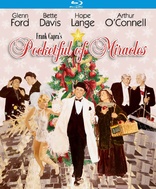Pocketful of Miracles Blu-ray Movie
HomePocketful of Miracles Blu-ray Movie 
Kino Lorber | 1961 | 137 min | Not rated | Nov 18, 2014Movie rating
7.2 | / 10 |
Blu-ray rating
| Users | 0.0 | |
| Reviewer | 3.0 | |
| Overall | 3.0 |
Overview
Pocketful of Miracles (1961)
A good-hearted gangster turns an old apple seller into a society matron so she can impress her daughter.
Starring: Glenn Ford, Bette Davis, Hope Lange, Arthur O'Connell, Peter FalkDirector: Frank Capra
| Drama | Uncertain |
| Comedy | Uncertain |
Specifications
Video
Video codec: MPEG-4 AVC
Video resolution: 1080p
Aspect ratio: 2.35:1
Original aspect ratio: 2.35:1
Audio
English: DTS-HD Master Audio 2.0 Mono
Subtitles
English
Discs
25GB Blu-ray Disc
Single disc (1 BD)
Playback
Region A (C untested)
Review
Rating summary
| Movie | 3.0 | |
| Video | 3.0 | |
| Audio | 3.5 | |
| Extras | 0.5 | |
| Overall | 3.0 |
Pocketful of Miracles Blu-ray Movie Review
The Return of Apple Annie and Dave the Dude
Reviewed by Michael Reuben November 29, 2014The final film directed by Frank Capra (It's a Wonderful Life) was a long-planned remake of his previous black-and-white 1933 classic, Lady for a Day, based on the Damon Runyon story "Madame La Gimp". The production was not a happy experience for Capra. By the time he had finished negotiating with Columbia Studios over the rights (which he eventually had to buy back with his own money), the director had lost his first choice for the film's two leads, Frank Sinatra and Shirley Booth. The role of bootlegger Dave the Dude eventually went to Glenn Ford, even though Capra thought Ford wasn't right for the part. But Ford, who took an associate producer credit, was willing to help fund the picture. With no studio interested in backing the project fully and Capra's own reputation at its nadir, Ford's offer was one the director couldn't refuse. He also had to cast Ford's then-girlfriend, Hope Lange, in the supporting role of club owner Queenie Martin, although Capra had originally signed Shirley Jones. For the other lead role, that of Apple Annie, Capra ended up with Bette Davis, who needed a paycheck but almost immediately began feuding with Ford over a variety of sleights, both big and small. Their poor relations made for a tense set, and Capra suffered from blinding headaches throughout the shoot. It didn't help when the film was released to poor reviews and weak box office, because Capra's financial deal was based on the "back end". When Pocketful of Miracles failed to earn back its production cost, Capra lost money. Over the years, however, Pocketful of Miracles has retained a loyal following, especially as Capra's reputation has revived. The film is too long and the comedy too broad, but its story remains grounded by the tartly comic performance (nominated for an Oscar) by Peter Falk as Ford's right-hand man, the only gangster in New York who seems to be serious about doing the kind of "business" that gangsters are supposed to do.
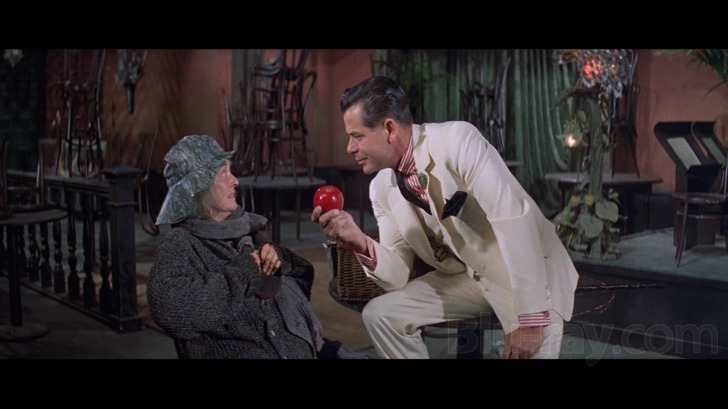
As in Lady for a Day, a gin-soaked old beggar known as Apple Annie (Davis) haunts Times Square selling apples for whatever passersby can spare. But this Annie is more entrepreneurial. Like Mr. Peachum in The Threepenny Opera , she has organized the local panhandlers and acts as their boss, assigning territories and claiming a share of their take. She spends none of the money on herself. For years, Annie has been sending funds to Europe to educate and support her daughter, Louise (Ann-Margret, in her film debut), who believes that her mother is a New York society lady named Mrs. E. Worthington Manville. Annie has spun this fantasy in letters written on stationery swiped by a bellman from the upscale Marberry Hotel, which she has been using as her return address. The bellman also smuggles out Louise's responding letters. Buying an apple from Annie is the good luck charm of bootlegger Dave the Dude (Ford), whose expanded story accounts for much of the forty minutes by which Pocketful of Miracles exceeds Lady for a Day. In the script by Hal Kanter and Harry Tugend (Road to Bali), we learn how Dave first met Queenie Martin (Lange) and transformed her from an old-fashioned girl into a sassy and successful club owner. But when Prohibition ends, Queenie reverts to her roots and wants Dave to retire with her to a quiet life in a nice little house. Dave prefers to stay in New York and move on to the next big thing. Their tussle over marriage has overtones of the one between the commitment-phobic Nathan Detroit and Miss Adelaide in Guys and Dolls, which was also based on Damon Runyon's stories and which, in the film version, starred Frank Sinatra, Capra's original choice for Dave the Dude. Dave's "next big thing" is represented by Chicago mobster Steve Darcey, played with comical menace by Sheldon Leonard, who had already started his second career as one of the most successful TV producers of the Sixties. In a single scene, Leonard establishes Darcey's presence, then haunts the rest of the film, as Dave keeps Darcey dangling on the fringes of the city, secure from law enforcement in a luxury suite disguised as a furniture moving van, while Dave attends to other business and Dave's chief lieutenant, Joy Boy (Falk), ties himself into ever-tighter knots of frustration. Dave's "other business" is Apple Annie, who is panicked when her daughter's latest letter announces that she is arriving in New York with her fiancé, Carlos Romero (Peter Mann), and his father, Count Alfonso Romero (Arthur O'Donnell, who looks even less Spanish than he sounds). The Count wants to meet Louise's family, and Annie's charade will collapse, but, under pressure from Queenie, Dave undertakes to make it come true in a kind of reverse Cinderella story that was the centerpiece of Lady for a Day. An army of makeover artists transforms Annie, a penthouse at the Marberry is secured, and a smooth-talking pool shark, Judge Henry G. Blake (Thomas Mitchell, who played Gerald O'Hara in Gone with the Wind) is recruited to play Louise's stepfather. With the aid of a conspiratorial butler (Edward Everett Horton), it all seems to work until Count Romero insists that "Mrs. Manville" hold a reception so that he can meet her society friends. Capra often directed comedy at a manic pace, but not always to best effect. In Arsenic and Old Lace, he had Cary Grant running around at high speed like a gibbering idiot, and the result was that Grant wasn't particularly funny. The best laughs arose from his quietly dotty aunts and his psychotically evil but deliberately spoken brother. Much of Pocketful of Miracles is played at the same breakneck pace, especially when Ford and Lange go at each other; if those scenes were ever funny (and I don't remember that they were), they've lost much of their humor today, when physical mayhem between couples no longer looks like foreplay. It's Falk's Joy Boy who steals every scene he's in, because he keeps finding new ways to simmer with barely contained fury until he eventually boils over into an explosive reaction, usually something snappy and to-the-point—or maybe just a physical response, like his sharply interrupted consumption of a glass of whisky when Dave gets a surprising piece of news.
Pocketful of Miracles Blu-ray Movie, Video Quality 
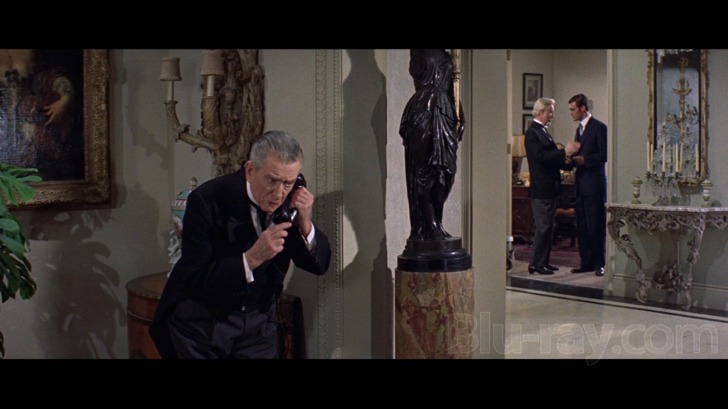
Pocketful of Miracles was shot in anamorphic widescreen by Robert Bronner (7 Faces of Dr. Lao), who often filled the entire width of the frame with people and activity. Kino Video's 1080p, AVC-encoded Blu-ray is an acceptable but underwhelming presentation of this 1961 classic that appears to have been taken from a source one or two generations away from the original camera negative. Detail is plentiful, as can readily be seen in the many long shots containing dozens of people, but the detail isn't fine, which becomes evident in both closeups and in medium and long shots as one draws closer to the screen. Instead of fine detail, one observes a softening of the image and coarsening of the grain structure that some viewers may attribute to digital manipulation; to my eye it simply indicates the limitations of the source. Colors are decently rich and well-saturated, and the blacks are strong, all of which helps show off the spectacular wardrobe designed by the legendary Edith Head for Hope Lange and also for Ann-Margret and for Bette Davis after Annie's transformation into Mrs. Manville. The bright lights and glittery costumes of Queenie's club also flash and pop appropriately. The quality of the image is good enough to make it very obvious that the city landscape has been recreated on a backlot, but that isn't surprising for films of this era. Despite the 137-minute running time, Kino has placed Pocketful of Miracles on a BD-25. The result is a disappointing average bitrate of 18.96 Mbps, which is simply too low for a production originated on film with many complicated scenes containing numerous figures. Minor compression noise can be observed from time to time, and it is entirely possible that the soft and grainy texture would be improved with less compression and higher bandwidth. To know for certain, however, one would need access to the uncompressed original scan.
Pocketful of Miracles Blu-ray Movie, Audio Quality 
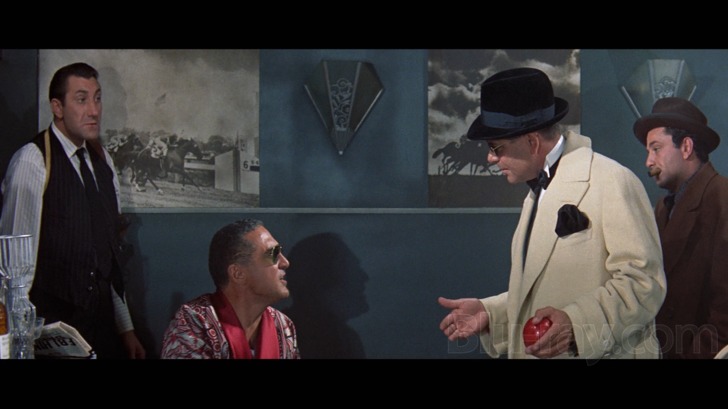
Kino has encoded the film's original mono track as lossless DTS-HD MA 2.0 with identical left and right front channels. It's a solid but unremarkable track with clearly rendered dialogue, decent dynamic range and good fidelity for the musical score credited to Walter Scharf (The Nutty Professor), although Tchaikovsky's The Nutcracker Suite is the most memorable of the instrumentals on the soundtrack. The title song by Sammy Cahn and Jimmy Van Heusen plays over the credits, and Ann-Margret does her first onscreen singing in an a capella rendition of "The Riddle Song".
Pocketful of Miracles Blu-ray Movie, Special Features and Extras 
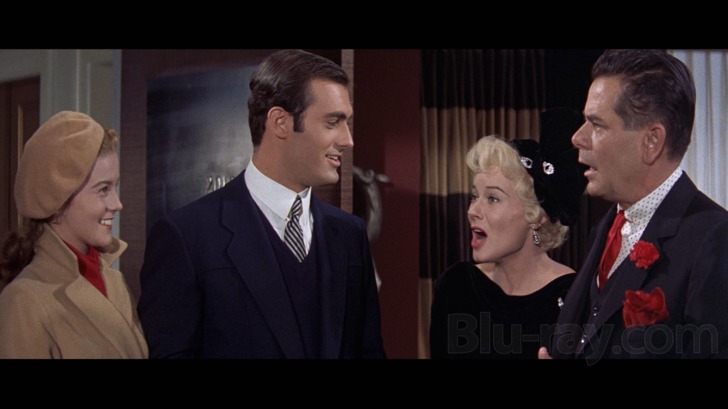
The only extra is a trailer (480i; 1.85:1; 3:00) narrated by legendary variety show host Ed Sullivan.
Pocketful of Miracles Blu-ray Movie, Overall Score and Recommendation 
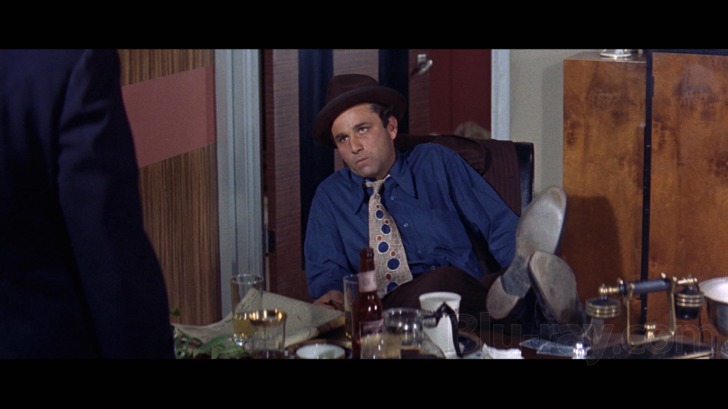
Pocketful of Miracles isn't explicitly a Christmas movie, but a few heavily decorated Christmas trees appear in the background of the climactic scenes at the penthouse of Mrs. E. Worthington Manville, and the film's spirit of generosity prompted MGM to hurry it into theaters for the 1961 holiday season, with "Jingle Bells" playing during the trailer. Ever since then, the film hasn't been able to shake the Christmas linkage, but there are worse fates. Kino has released a serviceable version in time for the holidays, and although the film has its flaws, as does the Blu-ray, it is recommended as the best version we're likely to see.
Similar titles
Similar titles you might also like

Garbo Talks
1984

Dead End
1937

Angels with Dirty Faces
Warner Archive Collection
1938

Prizzi's Honor
1985

Storm Warning
Warner Archive Collection
1951

Dinner at Eight
Warner Archive Collection
1933

The President's Analyst
Special Edition
1967

Nobody's Fool 4K
1994

State of the Union
Frank Capra's State of the Union
1948

No Orchids for Miss Blandish
1948

Party Girl
Warner Archive Collection
1958

Man on the Flying Trapeze
1935

Patterns
2K Restoration
1956

You Can Count on Me 4K
2000

Harry in Your Pocket!
1973

The Night They Raided Minsky's
1968

The Noose Hangs High
1948

The Odd Couple
1968

Skidoo
1968

Night After Night
1932
